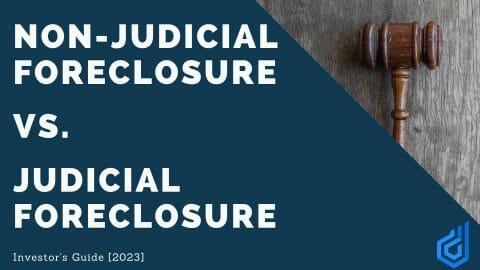
You found a non-performing note, or you already own a note, and you’re positioned to foreclose on the property securing it. It’s time to brush up on the differences between non-judicial and judicial foreclosures, so you know what to expect.
Legal property repossession parameters vary by state, and understanding the different aspects helps note investors navigate the note buying and due diligence processes.
What is Judicial Foreclosure?
Judicial foreclosure is the legal process a lender is required to follow to repossess a property. In states with judicial foreclosure laws, the lender must file a lawsuit with the court to begin foreclosure proceedings.

Once the suit’s been filed, the court reviews it for evidence of default, breach of loan terms, and other circumstances. Before the final court hearing, the borrower can attempt to reach a settlement with the lender or wait for the ruling to determine whether ownership can resume.
If the ruling favors the lender, the court will enter a judgment for foreclosure or “default judgment.” The lender can then legally proceed with a foreclosure sale. In some cases, judicial states will allow a non-judicial process if the mortgage note includes a power of sale clause.
What is a Power of Sale Clause?
A power of sale clause is written into mortgage contracts and gives the bank or investor the legal right to repossess a property if the borrower defaults. If a promissory note (mortgage) contains this clause, lenders may be able to bypass the judicial foreclosure process in certain circumstances.
What is Non-Judicial Foreclosure?
Non-judicial foreclosure means a lender doesn’t need to go through the courts to initiate foreclosure proceedings.
States without judicial foreclosure requirements make it easier for lenders and investors to repossess a property. Usually, the process moves much faster than it would in a judicial foreclosure state.
In non-judicial foreclosure states, lenders typically only need to send a delinquent borrower a notice of default and/or a notice of sale with a specific auction date to proceed with the property foreclosure. Exact processes and legal stipulations vary by state.
Most non-foreclosure states require that lenders appoint a third-party person or entity, known as a foreclosure trustee, to handle the process. The foreclosure trustee represents the lender during the repossession and is often selected by the lender due to legal or other affiliation; however, some states require that foreclosure trustees are neutral.
Other trustee parameters, like state licensing and business location, may also apply and vary by state.
Judicial vs. Non-Judicial Foreclosure

So what do the differences between judicial and non-judicial foreclosures mean for investors? The primary aspects to consider include:
Foreclosure Process
Non-Judicial: Minimal in most cases
Judicial: Extensive and unpredictable
Investors repossessing a property in a state with judicial foreclosure laws should expect ongoing legal proceedings and delays. Standard judicial processes can easily span months, and borrowers may halt proceedings at various points.
Timeframe
Non-Judicial: Fast
Judicial: Lengthy
When foreclosing on a property in a judicial state, expect to have legal representation and capital wrapped up for months. In a non-judicial process, proceedings typically move much faster, which means less overhead, faster returns, and less chance of borrower delays.
Overhead
Non-Judicial: Relatively low
Judicial: High
Non-judicial foreclosures move faster than judicial foreclosures, saving legal costs and limiting the time capital is wrapped up in the investment.
Pros of Judicial Foreclosure Process
While the judicial foreclosure process is usually more difficult for investors to navigate than non-judicial repossessions, there are some perks.
- Better chances of full repayment and cost recouping
- More flexibility when enforcing court-approved repossession
- Most judgments last for ten years, and investors can renew them for an additional ten years.
- In some cases, judicial foreclosure costs are relatively minimal and well-worth the legal repossession benefits gained by completing the process.
Pros of Non-Judicial Foreclosure Process
Though there are a few lender benefits in a judicial foreclosure process, the non-judicial process tends to be easier and lower risk.
- Fast foreclosure timeline (sometimes less than 40 days)
- Low overhead and minimal legal representation necessary
- More rapid investment capital return
- Fewer opportunities for process delays
Non-Judicial and Judicial Foreclosure Laws by State
Many U.S. states allow lenders to repossess a property though both non-judicial and judicial foreclosure processes, though some strictly follow one method or the other.
Here’s a rundown of each state’s foreclosure requirements and the average amount of time it takes to complete the process. Click the state name for specific statutes and requirements.**
| State | Judicial | Non-Judicial | Timeline (Typical # of Days) |
| Alabama | Yes | Yes | 30-60 |
| Alaska | Yes | Yes | 90 |
| Arizona | Yes | Yes | 90 |
| Arkansas | Yes | Yes | 120 |
| California | Yes | Yes | 120 |
| Colorado | Yes | Yes | 120 |
| Connecticut | Yes | No | 60 |
| Delaware | Yes | No | 90 |
| Florida | Yes | No | 180 |
| District of Columbia (DC) | No | Yes | 60 |
| Georgia | Yes | Yes | 90 |
| Hawaii | Yes | Yes | 60 |
| Idaho | No | Yes | 150 |
| Illinois | Yes | No | 210 |
| Indiana | Yes | No | 150 |
| Iowa | Yes | No | 150 |
| Kansas | Yes | No | 120 |
| Kentucky | Yes | No | Varies |
| Louisiana | Yes | No | 160 |
| Maine | Yes | No | 90 |
| Maryland | Yes | No | 90 |
| Massachusetts | Yes | Yes | 90 |
| Michigan | Yes | Yes | 60 |
| Minnesota | Yes | Yes | 60 |
| Mississippi | Yes | Yes | 60 |
| Missouri | Yes | Yes | 60 |
| Montana | Yes | Yes | 150 |
| Nebraska | Yes | No | 180 |
| Nevada | Yes | Yes | 120 |
| New Hampshire | Yes | Yes | 60 |
| New Jersey | Yes | No | 90 |
| New Mexico | Yes | No | 120 |
| New York | Yes | Yes | 120 |
| North Carolina | Yes | Yes | 60 |
| North Dakota | Yes | No | 90 |
| Ohio | Yes | No | 150 |
| Oklahoma | Yes | Yes | 90 |
| Oregon | Yes | Yes | 180 |
| Pennsylvania | Yes | No | 90 |
| Rhode Island | Yes | Yes | 60 |
| South Carolina | Yes | No | Varies |
| South Dakota | Yes | Yes | 90 |
| Tennessee | Yes | Yes | 60 |
| Texas | Yes | Yes | 60 |
| Utah | Yes | Yes | Varies |
| Vermont | Yes | Yes | 210 |
| Virginia | Yes | Yes | 60 |
| Washington (State) | Yes | Yes | 120 |
| West Virginia | Yes | Yes | 60 |
| Wisconsin | Yes | Yes | 90 |
| Wyoming | Yes | Yes | 90 |
**This chart is for general informational purposes only – please refer to state legislation for current laws and requirements and consult legal counsel for further details.
Risks for Note Investors Foreclosing on Properties in Judicial States
Investors going through judicial foreclosure processes face a few risks, including:
- Disruptions due to borrowers filing bankruptcy to avoid foreclosure
- Disruptions or delays due to inadequate documentation or missing records (requirements vary by state)
- Extended time (sometimes years) in litigation
- Delayed return on investment (money is wrapped up for the process’ duration)
- High overhead costs
While there are some judicial foreclosure benefits for investors, the potential risks are hard to fully scope until the process begins.
In contrast, non-judicial foreclosure proceedings involve limited third-party interaction, so costs and timeframes are more predictable.
How Can an Investor Limit Judicial Foreclosure Risks?
Investors can avoid judicial foreclosure problems through preparation and organization.
- Consult with local legal counsel familiar with the state’s foreclosure laws.
- Develop a list of all state laws, processes, and necessary documents and follow it accordingly.
- Meet deadlines, keep records of all communications and filings, and prepare for court hearings when applicable.
- Retain all documents and papers (original copies, if possible).
Bottom Line: Learn the laws, cover all the bases, and document all aspects of the process.
Judicial and Non-Judicial Foreclosure FAQs
How Long Do Judicial Foreclosures Take?
Judicial foreclosure timelines can span several months (or years) and vary based on the state and the situation. One thing’s for sure: it’ll be a while.
How Long Do Non-Judicial Foreclosures Take?
Non-judicial foreclosures can take as little as 40 days (or less), though most wrap up within two or three months.
Can You Still Live in Your House after Foreclosure?
Yes, it’s possible for occupants to stay in a property after the foreclosure process is complete. Timelines vary by state and circumstances, but usually, once the house is sold at auction, current residents have about 30 days to move out.
How Much Does Judicial Foreclosure Cost a Lender?
Foreclosure costs vary by lender, state, and circumstances, though fees average around 26% of the mortgage loan amount. So, lenders following the repossession process in a judicial foreclosure state for a $300,000 mortgage note could face around $75,000 in costs.
The legal costs of a judicial foreclosure account for the majority of the expenses in these cases, which is why many lenders and investors opt for the non-judicial route if it’s available.
What does this mean for note buyers? Opportunity. Investors may be able to negotiate deals during the pre-foreclosure stage by contacting banks with non-performing notes.
Since institutional lenders prefer to avoid the potentially high costs of foreclosure, most decision-makers are willing to sell non-performing notes. And that’s where BankProspector comes in. This industry-leading platform provides investors with real-time lender data and current decision-maker contact information.
Once you connect with a lender and make a deal, you gain control and can determine the best way to move forward with the note.

